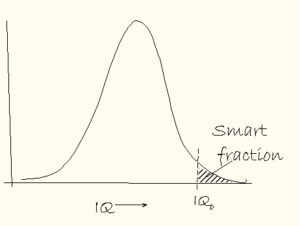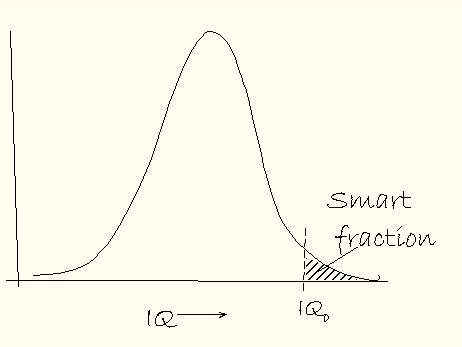
I am finishing up a large study on smart fraction theory (intellectual classes model). To this end, I reviewed all the empirical papers on the topic, and some historical ones. To save others and future-Emil the trouble of finding all these papers, here’s my collection. These are mainly collected by Google Scholar and following citing papers.
Proto-smart fraction theory:
- Terman, L. M. (1916). The uses of intelligence tests. The Measurement of Intelligence, 3–21.
The number of children with very superior ability is approximately as great as the number of feeble-minded. The future welfare of the country hinges, in no small degree, upon the right education of these superior children. Whether civilization moves on and up depends most on the advances made by creative thinkers and leaders in science, politics, art, morality, and religion. Moderate ability can follow, or imitate, but genius must show the way.
- Jensen, A. R. (1980). Bias in mental testing.
The social implications of exceptionally high ability and its interaction with the other factors that make for unusual achievements are considerably greater than the personal implications. The quality of a society’s culture is highly determined by the very small fraction of its population that is most exceptionally endowed. The growth of civilization, the development of written language and of mathematics, the great religious and philosophic insights, scientific discoveries, practical inventions, industrial developments, advancements in legal and political systems, and the world’s masterpieces of literature, architecture, music and painting, it seems safe to say, are attributable to a rare small proportion of the human population throughout history who undoubtedly possessed, in addition to other important qualities of talent, energy, and imagination, a high level of the essential mental ability measured by tests of intelligence.
[Added: Jensen in fact discussed this back in 1969 too, see Dalliard’s 40-year anniversary review of Jensen’s famous article]
La Griffe du Lion’s writings
- The Smart Fraction Theory of IQ and the Wealth of Nations, 2000
- Smart Fraction Theory II: Why Asians Lag. 2002
Academic papers
-
Rindermann, H., Sailer, M., & Thompson, J. (2009). The impact of smart fractions, cognitive ability of politicians and average competence of peoples on social development. Journal of Talent Development and Excellence, 1(1).
-
Rindermann, H., Ziegler, A., & Perleth, C. (2011). Results in the International Mathematical Olympiad (IMO) as indicators of the intellectual classes’ cognitive-ability level. Excellence. Essays in Honour of Kurt. A. Heller: Lit, Münster, 303-321.
-
Rindermann, H., & Thompson, J. (2011). Cognitive capitalism: The effect of cognitive ability on wealth, as mediated through scientific achievement and economic freedom. Psychological Science, 22(6), 754-763.
-
Rindermann, H. (2012). Intellectual classes, technological progress and economic development: The rise of cognitive capitalism. Personality and Individual Differences, 53(2), 108-113.
-
Rindermann, H., Kodila-Tedika, O., & Christainsen, G. (2015). Cognitive capital, good governance, and the wealth of nations. Intelligence, 51, 98-108.
-
Coyle, T. R., Rindermann, H., & Hancock, D. (2016). Cognitive capitalism: Economic freedom moderates the effects of intellectual and average classes on economic productivity. Psychological Reports, 119(2), 411-427.
- Azam, S. (2017). A cross-country empirical test of cognitive abilities and innovation nexus. International Journal of Educational Development, 53, 128-136.
-
Burhan, N. A. S., Che Razak, R., Salleh, F., & Labastida Tovar, M. E. (2017). Intelligence and the Ease of Doing Business: Does Intellectual Class Facilitate Leadership and Entrepreneurship?.
-
Burhan, N. A. S., Che Razak, R., Selamat, M. R., & Rosli, M. R. (2017). Intellectual Giftedness for Leadership: How Robust is the Crime Reducing Effect of Intellectual Class?.
-
Burhan, N. A. S., Razak, R. C., Salleh, F., & Tovar, M. E. L. (2017). The higher intelligence of the ‘creative minority’ provides the infrastructure for entrepreneurial innovation. Intelligence, 65, 93-106.
-
Burhan, N. A. S., Che Razak, R., Rosli, M. R., & Selamat, M. R. (2017). The Bell Curve of Intelligence, Economic Growth and Technological Achievement: How Robust is the Cross-Country Evidence?.
-
Burhan, N. A. S., Razak, R. C., Ibrahim, S., Selamat, M. R., & Rosli, M. R. (2018). Social classes of intelligence, economic growth and technological achievement: robust regression and outlier detection. Journal of Interdisciplinary Economics, 30(2), 148-163.
-
Rindermann, H. (2018). Cognitive capitalism: Human capital and the wellbeing of nations. Cambridge University Press.
-
Rindermann, H., & Carl, N. (2018). Human rights: Why countries differ. Comparative sociology, 17(1), 29-69.
-
Rindermann, H., & Carl, N. (2020). The Good Country Index, Cognitive Ability and Culture. Comparative Sociology, 19(1), 39-68.
